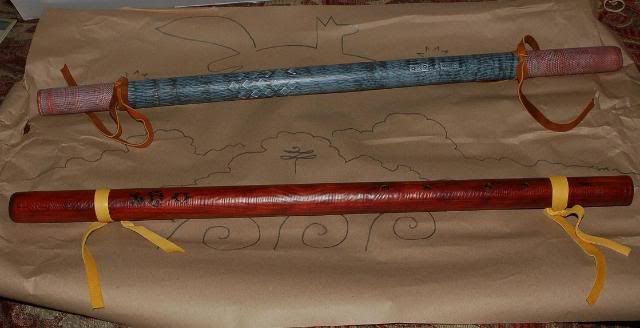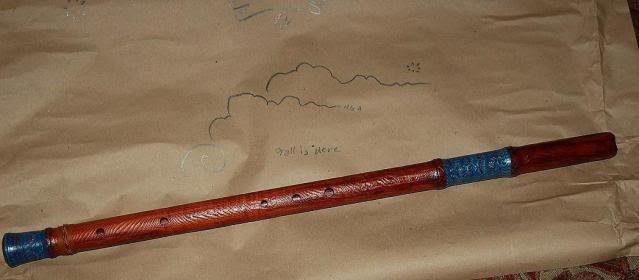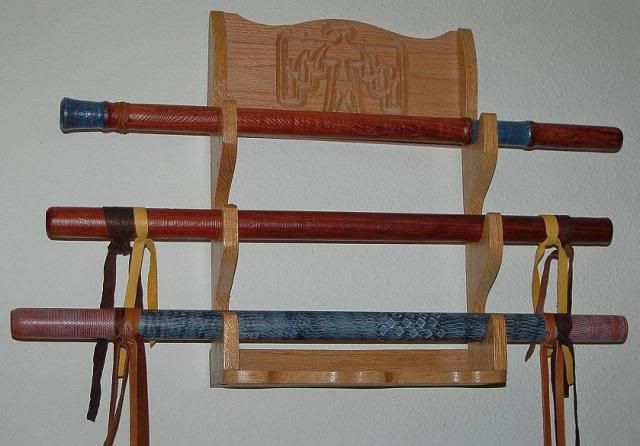Mujitsu and Tairaku's Shakuhachi BBQ
World Shakuhachi Discussion / Go to Live Shakuhachi Chat
You are not logged in.
Tube of delight!
#1 2009-11-27 08:57:01
- purehappiness
- Member

- From: Connecticut USA
- Registered: 2009-01-13
- Posts: 528
Anasazi flute?
I was wondering if anyone has any experience with this style flute and if it plays similar to shakuhachi. It looks interesting and since I can play shakuhachi I would think the anasazi should be easy to play. I am wondering how it sounds in comparison too.
I was not conscious whether I was riding on the wind or the wind was riding on me.
Lieh-tzu
Offline
#2 2009-11-27 11:32:37
- edosan
- Edomologist

- From: Salt Lake City
- Registered: 2005-10-09
- Posts: 2185
Re: Anasazi flute?
purehappiness wrote:
I was wondering if anyone has any experience with this style flute and if it plays similar to shakuhachi. It looks interesting and since I can play shakuhachi I would think the anasazi should be easy to play. I am wondering how it sounds in comparison too.
Zen is not easy.
It takes effort to attain nothingness.
And then what do you have?
Bupkes.
Offline
#4 2009-11-27 13:31:01
- purehappiness
- Member

- From: Connecticut USA
- Registered: 2009-01-13
- Posts: 528
Re: Anasazi flute?
I am thinking it may be like a cross between a shakuhachi and a native flute. It might be nice to have to play on occasion.
I was not conscious whether I was riding on the wind or the wind was riding on me.
Lieh-tzu
Offline
#5 2009-11-27 14:01:26
- purehappiness
- Member

- From: Connecticut USA
- Registered: 2009-01-13
- Posts: 528
Re: Anasazi flute?
Could you meri and kari on it? I would think so but the bore is probably small too.
I was not conscious whether I was riding on the wind or the wind was riding on me.
Lieh-tzu
Offline
#7 2009-11-27 15:12:02
- purehappiness
- Member

- From: Connecticut USA
- Registered: 2009-01-13
- Posts: 528
Re: Anasazi flute?
![]()
I was not conscious whether I was riding on the wind or the wind was riding on me.
Lieh-tzu
Offline
#8 2009-11-27 20:47:40
- waryr
- Member

- From: Leesburg Florida
- Registered: 2005-10-10
- Posts: 70
Re: Anasazi flute?
I have been playing Anasazi as well as shakuhachi for 4 or 5 years. You can meri and keri on the Anasazi, but to a limited degree due to the mouthpiece, if any, being a lot shallower than the shakuhachi. Most of the ones I play only have a rim and no "mouthpiece" formed in the flute.
The sound is soft and sonorous, especially when miked and amplified. This is due to the aspect ratio being very near to the overtune flutes made and played in the Balkans.
Be advised, the scale of these flutes is very different from shakuhachi. They do grow on you, however!
Dave McCullen
If you understand, things are just as they are, if you don't understand, things are just as they are.
Offline
#9 2009-11-28 06:35:22
- purehappiness
- Member

- From: Connecticut USA
- Registered: 2009-01-13
- Posts: 528
Re: Anasazi flute?
Thanks. The anasazi sounds interesting. I may get one eventually just to have something different but for now I should make the shakuhachi my flute of choice. There are some nice looking ones out there though.It looks like the shakuhachi is the king as far as the abilities of playing possibilities it can do.
Last edited by purehappiness (2009-11-28 06:38:43)
I was not conscious whether I was riding on the wind or the wind was riding on me.
Lieh-tzu
Offline
#10 2009-11-28 18:28:08
Re: Anasazi flute?
The flutes will differ from maker to maker and so will the blowing edge.
Offline
#11 2009-11-29 10:34:48
- purehappiness
- Member

- From: Connecticut USA
- Registered: 2009-01-13
- Posts: 528
Re: Anasazi flute?
Hello aluaki,
It is nice to meet you. Welcome to the shakuhachi forum. Native american flutes were my first desire to get into but I eventually went to the shakuhachi. I still do wish to get a native american flute, also. I hope you enjoy learning about the shakuhachi.
I was not conscious whether I was riding on the wind or the wind was riding on me.
Lieh-tzu
Offline
#12 2009-12-05 00:09:52
Re: Anasazi flute?
I have been looking at the Earthtone flutes hungrily for a little while now. I've been thinking of getting some low flutes, and came to the realization that they didn't have to be shakuhachi to satisfy my urge for a deep low sound.
This was a clincher video for me:
http://www.youtube.com/watch?v=MLioZXdCrjg
Just lovely. Scott August really seems to know what he's doing.
Offline
#13 2009-12-05 07:19:33
- purehappiness
- Member

- From: Connecticut USA
- Registered: 2009-01-13
- Posts: 528
Re: Anasazi flute?
I have been listening to coyote oldman and he is quite good also.
I was not conscious whether I was riding on the wind or the wind was riding on me.
Lieh-tzu
Offline
#14 2009-12-05 10:36:52
- edosan
- Edomologist

- From: Salt Lake City
- Registered: 2005-10-09
- Posts: 2185
Re: Anasazi flute?
axolotl wrote:
I have been looking at the Earthtone flutes hungrily for a little while now. I've been thinking of getting some low flutes, and came to the realization that they didn't have to be shakuhachi to satisfy my urge for a deep low sound.
This was a clincher video for me:
http://www.youtube.com/watch?v=MLioZXdCrjg
Just lovely. Scott August really seems to know what he's doing.
Huge amount of signal processing on that...different kettle of fish playing it in your own living room.
Zen is not easy.
It takes effort to attain nothingness.
And then what do you have?
Bupkes.
Offline
#15 2009-12-05 10:54:59
- Jim Thompson
- Moderator

- From: Santa Monica, California
- Registered: 2007-11-28
- Posts: 421
Re: Anasazi flute?
edosan wrote:
Huge amount of signal processing on that...different kettle of fish playing it in your own living room.
Ed makes a good point. Not to impugn the guys work, it's actually quite beautiful. But there is enough delay and reverb to make a belch fascinating.
" Who do you trust , me or your own eyes?" - Groucho Marx
Offline
#16 2009-12-05 22:43:11
- radi0gnome
- Member

- From: Kingston NY
- Registered: 2006-12-29
- Posts: 1030
- Website
Re: Anasazi flute?
Jim Thompson wrote:
edosan wrote:
Huge amount of signal processing on that...different kettle of fish playing it in your own living room.
Ed makes a good point. Not to impugn the guys work, it's actually quite beautiful. But there is enough delay and reverb to make a belch fascinating.
Isn't that to simulate the echo in the canyon's the Native American's played them in? It's probably the way they were supposed to be heard. When they were invented living rooms weren't even considered.
"Now birds record new harmonie, And trees do whistle melodies;
Now everything that nature breeds, Doth clad itself in pleasant weeds."
~ Thomas Watson - England's Helicon ca 1580
Offline
#17 2009-12-05 22:58:08
- edosan
- Edomologist

- From: Salt Lake City
- Registered: 2005-10-09
- Posts: 2185
Re: Anasazi flute?
radi0gnome wrote:
Jim Thompson wrote:
edosan wrote:
Huge amount of signal processing on that...different kettle of fish playing it in your own living room.
Ed makes a good point. Not to impugn the guys work, it's actually quite beautiful. But there is enough delay and reverb to make a belch fascinating.
Isn't that to simulate the echo in the canyon's the Native American's played them in? It's probably the way they were supposed to be heard. When they were invented living rooms weren't even considered.
Indeed it is, meaning that in order to obtain such a sound, you've got to get you a canyon or a signal processor, which was my very obvious point.
Zen is not easy.
It takes effort to attain nothingness.
And then what do you have?
Bupkes.
Offline
#18 2010-01-20 19:11:49
- FluteSwordsman
- Member

- Registered: 2010-01-18
- Posts: 19
Re: Anasazi flute?
I have had an Anasazi flute by Eriktheflutemaker now for a year. My advice; if you are going to buy an Anasazi flute, only buy form him if you are fine with having a 1 and a half octave flute rather than the two octave normal. Also, he makes the flute with the same mouthpiece as the Quena.
As for the previous comment about the load of reverb: That's true, that recording has more reverb than you would actually find in a real canyon! But I have seen and played an Earthtones Anasazi flute and they actually have very good resonance.
This is the full range that an Anasazi flute can play according to Scott August:
http://www.cedarmesa.com/members/member … scale.html
Offline
#19 2010-01-21 14:07:34
- purehappiness
- Member

- From: Connecticut USA
- Registered: 2009-01-13
- Posts: 528
Re: Anasazi flute?
Thanks. An anasazi will probably be in my future but I think it will have to wait for now. I still have to master? the shakuahchi first. Or, will it master me? Maybe, one day I can be like the kid in the last dragon that caught the arrow and finally become a master. ![]()
Last edited by purehappiness (2010-01-21 14:10:28)
I was not conscious whether I was riding on the wind or the wind was riding on me.
Lieh-tzu
Offline
#20 2010-01-26 14:31:43
Re: Anasazi flute?
I swore I wouldn't buy any other types of flutes until I mastered the kan register. Well, it's not 'mastered' per se, but it's pretty good. (This week I will try to wrestle dai kan re out...we'll see about that one.) This means I am free to buy anasazi flutes, moxeños, fujaras, contrabass High Spirit NAFs and everything else on my wish list! ...of course there are bills to pay first.
Were I to run out and buy an Anasazi flute tomorrow, I wouldn't get any Mojave or Quena style modifications. I'd go straight for Coyote Oldman's original G# flute based on the original instrument. Is best way.
Offline
#21 2010-01-26 18:56:57
- waryr
- Member

- From: Leesburg Florida
- Registered: 2005-10-10
- Posts: 70
Re: Anasazi flute?
"Were I to run out and buy an Anasazi flute tomorrow, I wouldn't get any Mojave or Quena style modifications. I'd go straight for Coyote Oldman's original G# flute based on the original instrument. Is best way."
I have one of Michael's original design with just the straight cut across the flute and no shaping/modifications of the blowing area. This is truly the only way to experience the anasazi properly.
If you understand, things are just as they are, if you don't understand, things are just as they are.
Offline
#22 2011-02-10 12:25:36
Re: Anasazi flute?
I started rim blown flutes(and the whole Native American immersion being part Native myself) on both Anasazi and Hopi,Mojave flutes before moving on to the shakuhachi. I love the sounds and history of the Anasazi and it's relatives,the Hopi and Mojave. They are a bit easier to play than the shakuhachi but a bit tougher to achieve loudness on. I currently own three Coyote Oldman flutes,pictured below: The Anasazi,the Mojave and then the Hopi.


They are beautiful flutes and well worth the money.Compared to most shakuhachi they are a bargain.I have done well with playing and recording these flutes so that helped in my transition to shakuhachi.But I will say the shakuhachi is indeed a lifelong of learning whereas the native rims are mastered more quickly. If interested in more Native flutes,try the Flute Portal (many here already know about it) at:
http://forums.fluteportal.com
Jim
Vancouver,Washington USA
Offline
#23 2011-02-10 12:36:20
Re: Anasazi flute?
In addition to the above post,I know both Coyote Oldman (Michael Allen) and Scott August personally and have taken classes with Scott.Great guys and they are wonderful artists.Michael has a rather large discography out and the rim blown CD's are by far my favourite with "Rainbird" and "Under an Ancient Sky" being primarily rim blown flutes. Delightful music!!
Jim
Offline